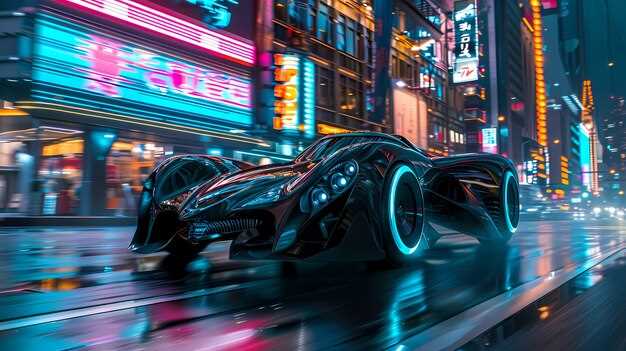
The Paris Auto Show 2025 has emerged as a pivotal event in the automotive industry, showcasing the latest advancements and trends that will shape the future of mobility. As manufacturers unveil their groundbreaking innovations, the focus is clearly on sustainability, connectivity, and performance. This year’s show highlights how technology and design are converging to create a new generation of automobiles that meet the demands of modern consumers.
One of the most notable trends at the show is the acceleration towards electric and hybrid vehicles. Major car manufacturers are presenting their latest eco-friendly models, emphasizing a commitment to reducing carbon emissions while enhancing driving experiences. As electric auto technology continues to evolve, it is clear that the future of transportation lies in sustainable solutions that do not compromise performance.
Additionally, connectivity and automation are at the forefront of this year’s innovations. The integration of advanced driver-assistance systems and autonomous features is transforming how we interact with our cars. Manufacturers are demonstrating cutting-edge technologies that facilitate seamless communication between vehicles and their surroundings, paving the way for smarter cities and safer roads.
As we delve deeper into the highlights from the Paris Auto Show 2025, we’ll explore the key innovations that are setting new standards for the auto industry and discuss the broader implications of these trends on the future of personal and shared mobility. This examination reveals not only where we are headed, but also the exciting possibilities that lie ahead in the world of cars.
Breakthrough Electric Vehicle Technologies Showcased

The Paris Auto Show 2025 has set a new standard for innovation in the electric vehicle (EV) sector. Leading manufacturers introduced several groundbreaking technologies aimed at enhancing performance, efficiency, and sustainability in the automotive industry. Among these innovations, advancements in solid-state battery technology stood out, promising greater energy density and faster charging times compared to traditional lithium-ion batteries.
Another significant highlight was the deployment of ultra-fast charging infrastructure, enabling electric cars to recharge their batteries in under 10 minutes. This revolutionary development could address range anxiety and facilitate long-distance travel for EV owners. Various companies also showcased wireless charging systems, which allow vehicles to charge automatically when parked in designated areas, making the process more convenient for users.
The introduction of advanced software and artificial intelligence in electric cars was prominent at the show. These technologies improve driving efficiency by optimizing route planning and energy consumption. Enhanced autonomous driving features were demonstrated, showcasing how electric vehicles could merge cutting-edge safety with environmental stewardship.
Moreover, manufacturers highlighted the use of sustainable materials in vehicle construction, reflecting a commitment to reducing the carbon footprint throughout the lifecycle of electric cars. This trend signifies a shift towards a more circular economy in the automotive sector, which is essential for meeting global sustainability goals.
Overall, the innovations showcased at the Paris Auto Show not only promise to reshape the future of electric vehicles but also underline the industry’s dedication to creating a more eco-friendly and technologically advanced automotive landscape.
Impact of Autonomous Driving Features on Consumer Choices
The 2025 Paris Auto Show showcased a remarkable array of innovations, particularly in the realm of autonomous driving. These cutting-edge features are significantly influencing consumer behavior and preferences in the automotive market.
As more manufacturers unveil their latest autonomous technologies, the trends suggest a shift in how consumers perceive safety, convenience, and overall driving experience.
- Safety Concerns: Many consumers prioritize safety when purchasing a car. Autonomous driving features, such as emergency braking and lane-keeping assistance, have become pivotal in influencing their decisions. The perception that autonomous vehicles can minimize human error makes them increasingly attractive.
- Convenience and Lifestyle: The integration of advanced driving assistance systems allows drivers to multitask and enjoy leisure activities during commutes. Consumers are drawn to the idea of using travel time more productively, which makes autonomous vehicles appealing in urban settings.
- Cost Implications: While autonomous cars often come with a higher price tag, many consumers are willing to invest in technology that enhances their driving experience. Features like adaptive cruise control and automated parking are seen as valuable additions that can justify the cost.
- Environmental Impact: Trends indicate that consumers are increasingly aware of the environmental footprint of their vehicles. Some autonomous technologies are designed to improve efficiency and reduce emissions, attracting eco-conscious buyers.
Furthermore, the demonstration of these features at the Paris Auto Show is crucial. Hands-on experiences with autonomous driving modalities allow potential buyers to better understand their functionality and benefits. This direct interaction can significantly sway purchasing decisions.
In conclusion, the impact of autonomous driving features on consumer choices is multifaceted, driven by safety, convenience, cost, and environmental considerations. As trends evolve, the automotive landscape is likely to be shaped by consumers who prioritize these advanced technologies in their purchasing journey.
Sustainable Materials Revolutionizing Car Design

The Paris Auto Show 2025 has highlighted a significant shift towards sustainable materials in car manufacturing, reflecting broader trends in the automotive industry. Manufacturers are increasingly exploring alternatives to traditional materials, focusing on eco-friendly options that reduce environmental impact while maintaining performance and aesthetics.
Biodegradable composites, recycled plastics, and natural fibers are gaining traction, enabling designs that are both innovative and sustainable. Automakers are showcasing vehicles made with these materials, demonstrating not only their commitment to sustainability but also their ability to create lightweight and durable components. This trend is expected to influence future car models significantly.
Furthermore, the integration of sustainable materials into car design offers a unique opportunity for brands to differentiate themselves in a competitive market. Companies are leveraging this opportunity to attract environmentally conscious consumers, who prioritize sustainability in their purchasing decisions. The result is a more profound relationship between consumers and brands, rooted in shared values.
As the auto industry continues to evolve, the adoption of sustainable materials will likely set the standard for future innovations. The ongoing emphasis on sustainability at events like the Paris Auto Show signals a major shift that could redefine the landscape of car design for years to come.
